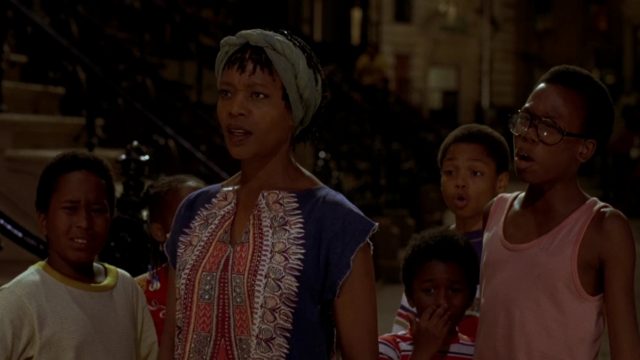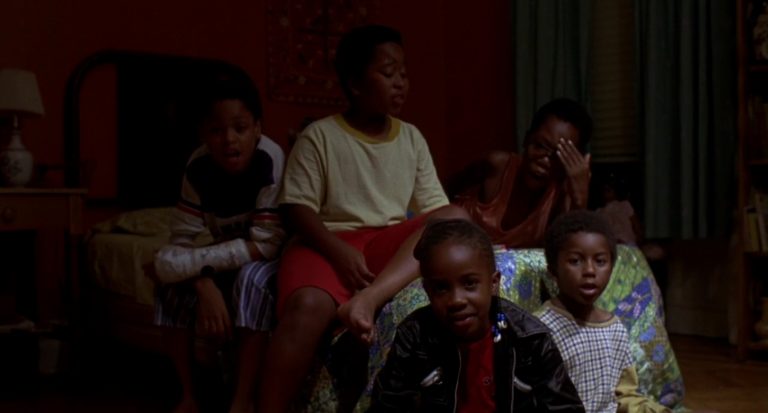The 1990s were, in large part, Spike Lee’s historical period, his investigations into his country’s turbulent recent past taking the forms of studio biopic (Malcolm X), documentary (4 Little Girls), ensemble crime epic (Summer of Sam), and others. But of all the director’s films, none is as close to his own personal history as Crooklyn, co-written by his sister Joie and brother Cinqué and based on their collective coming of age in Brooklyn in the early ‘70s. This is Lee’s take on an autobiographical, plotless memory piece — a form whose often indelible expressions range from The Mirror to Avalon, from Radio Days to 20th Century Women, from Terence Davies’ work in the 1980s and 1990s to Terrence Malick’s in the 2010s.
Crooklyn is not on the level of the best of those films, but it’s probably Lee’s warmest, most generous feature, which makes its lukewarm commercial reception even more retroactively disappointing than in the case of some of the director’s subsequent efforts — although it has been remembered fondly enough to be picked by New Yorkers for simultaneous screenings across the city in 2017, beating out the certified classic On the Town. Much of it plays like the first hour of Do the Right Thing without the ticking-time-bomb quality and with more subdued, cozy colors — a hangout movie cataloguing incident and behavior, not necessarily with an endpoint in sight. Not that it isn’t aggressive, with its share of pent-up emotion, attention-grabbing stylistic tricks, and shouting matches filmed in close-up. The first line spoken is “On your mark, get set, go!”; this is a boy shouting to his friends who are about to race each other, but the words betray Lee’s fusion of the grounded and the theatrical.
It’s the stuff of everyday life, but in Lee’s hands, it explodes onto the screen — the street games and kooky neighborhood characters, the gatherings on the stoop and rowdy dinners shared by 8-year-old Troy (Zelda Harris) and her four brothers, all living in a Brooklyn brownstone. Their parents are there too: the put-upon, fiercely protective teacher mother (a commanding Alfre Woodard), the sweet and gentle but naive struggling-musician father (Delroy Lindo). Childhood in an early-’70s, melting-pot, summertime New York is a chaotic time: there’s shoplifting, a pair of menacing glue huffers (one of them played by Lee himself) who cross over from real life into Troy’s nightmares, RuPaul turning up for a cameo as a woman dancing to “El Pito” in a bodega and rejecting the advances of a stocky middle-aged Puerto Rican. And then you get to the stuff that’s much more commonly recognizable but still specific and deeply felt: the siblings singing along with live acts on TV (and changing lyrics to make fun of each other on the fly), the money problems, the quiet thrill of traveling cross-country at night, the distaste for very particular foods — in this case, black-eyed peas, which disgust Nate (Chris Knowings) so much he resorts to some drastic, gross measures to avoid eating them, — the creative insults (“coconut West Indian monkey!”) thoughtlessly hurled by the kids at each other and non-supervising adults.
If there’s anything Crooklyn is, it’s direct, and that quality is at the root of its inspired touches as well as its shortcomings. Scenes come hard and fast, with the film constantly changing tone and energy, at times becoming an emotional whirlwind — an approach that reflects the state of mind of a preteen girl taking all of this in day in, day out (the fact that Troy, rather than one of her brothers, is the protagonist, betrays that the screenplay originated with Joie Lee), but occasionally proves exhausting. Same goes for the almost literally wall-to-wall soundtrack, which consists of over two dozen killer soul tunes that define the setting and inject the film with additional energy, but suffers at times from being overly obvious and at others from Lee just leaving it blaring at full volume over dialogue scenes. In the film’s second half, Troy goes to stay with her overbearing Southern aunt, soon getting bewildered and exasperated by this different world and the way its people talk and behave, and Lee reflects her alienation by shooting in widescreen without adjusting the image for 1.85:1, which makes everyone look squeezed from the sides — a bracing, pleasantly exploratory technique that, nevertheless, doesn’t make this section any easier on the audience than on its heroine, leaving both hoping to come back to Brooklyn as soon as possible.
Alas, it doesn’t get easier for Troy when she’s back home: a family tragedy awaits, a momentous event that the film, surprisingly, doesn’t quite treat as such, almost filing it along with everything else under life’s rich tapestry and rolling along, with Troy’s grief worked through remarkably quick and family unity emphasized over pain. Is this an honest depiction of a child not feeling any greater weight from a life-altering situation, or is it adults still coping with what they’re telling their story about? Regardless, it stands in the way of catharsis, further positioning the film as the cinematic equivalent of that one crazy childhood summer when too much happened and too little time was there to adequately process it. It’s a journey worth taking anyway.


